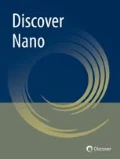Information (electronic and photonic) and renewable energy (solar energy, fuel cells, batteries, etc.) technologies have reached an advanced stage in their development—realizing engineering limits in cost-effective improvement for current technological approaches. The feature sizes of the latest generations of electronic devices are approaching atomic dimensions, interconnect bottlenecks are limiting circuit speeds, new materials are being introduced into microelectronics manufacture at an unprecedented rate, and alternative technologies to mainstream CMOS are being considered. The low cost of conventional fossil fuel sources without regard to the environmental impact resulting from the consumption of such energy sources has been long-standing economic barriers to the development of alternative and more efficient renewable energy sources, fuel cells and batteries. Nanotechnology is widely accepted as offering potential solutions for securing future progress in information and energy technologies.
This special issue of Nano Scale Research Letters is devoted to a better understanding of the function and design of nano and molecular scale devices that are relevant to future electronics, photonics and solar energy applications. Papers contained in this special issue are selected from the symposium “Nano and Giga Challenges in Electronics and Photonics” (NGC2009) and 14th Canadian Semiconductor Technology Conference (CSTC2009), which were held as a joint event and hosted by McMaster University (August 10–14, 2009, Hamilton, Ontario, Canada). The issue addresses both theoretical and experimental achievements in nanoscale science and technology for materials and device design in various fields of information (electronics and photonics) and renewable energy (photovoltaics and energy storage) applications.
The CSTC forum was established 25 years ago in Ottawa as an important symbol of the intrinsic strength of the Canadian semiconductor research and development community, and the Canadian semiconductor industry as a whole. In 2007, the 13th CSTC was held in Montreal, moving for the first time outside the national capital region. The first three meetings in the series of Nano & Giga Challenges conferences, NGCM2002 in Moscow, NGCM2004 in Krakow and NGC2007 in Phoenix, were focused on the interdisciplinary research in electronics and photonics from the fundamentals of materials science to the development of new system architectures. The NGC/CSTC 2009 joint forum expanded its topics to renewable energy research and development.
The success of the conference would not have been possible without generous support from many sponsors and research institutions, especially from McMaster University (conference host and co-organizer), Arizona State University, Russian Nanotechnologies Corporation, Springer Publishing Company, NT-MDT, Nokia, Oak Ridge National Laboratory, Ontario Center of Excellence, CMC Microsystems, Sematech and other local, national and international and individual supporters.
Open Access
This article is distributed under the terms of the Creative Commons Attribution Noncommercial License which permits any noncommercial use, distribution, and reproduction in any medium, provided the original author(s) and source are credited.
Author information
Authors and Affiliations
Corresponding author
Rights and permissions
Open Access This article is distributed under the terms of the Creative Commons Attribution 2.0 International License (https://creativecommons.org/licenses/by/2.0), which permits unrestricted use, distribution, and reproduction in any medium, provided the original work is properly cited.
About this article
Cite this article
Korkin, A., Krstic, P., Miskovic, Z. et al. Nanoscale Science and Technology for Electronics, Photonics and Renewable Energy Applications: Selected Papers from NGC2009 & CSTC2009 conference (http://asdn.net/ngc2009/). Nanoscale Res Lett 5, 453 (2010). https://doi.org/10.1007/s11671-010-9564-7
Published:
DOI: https://doi.org/10.1007/s11671-010-9564-7

